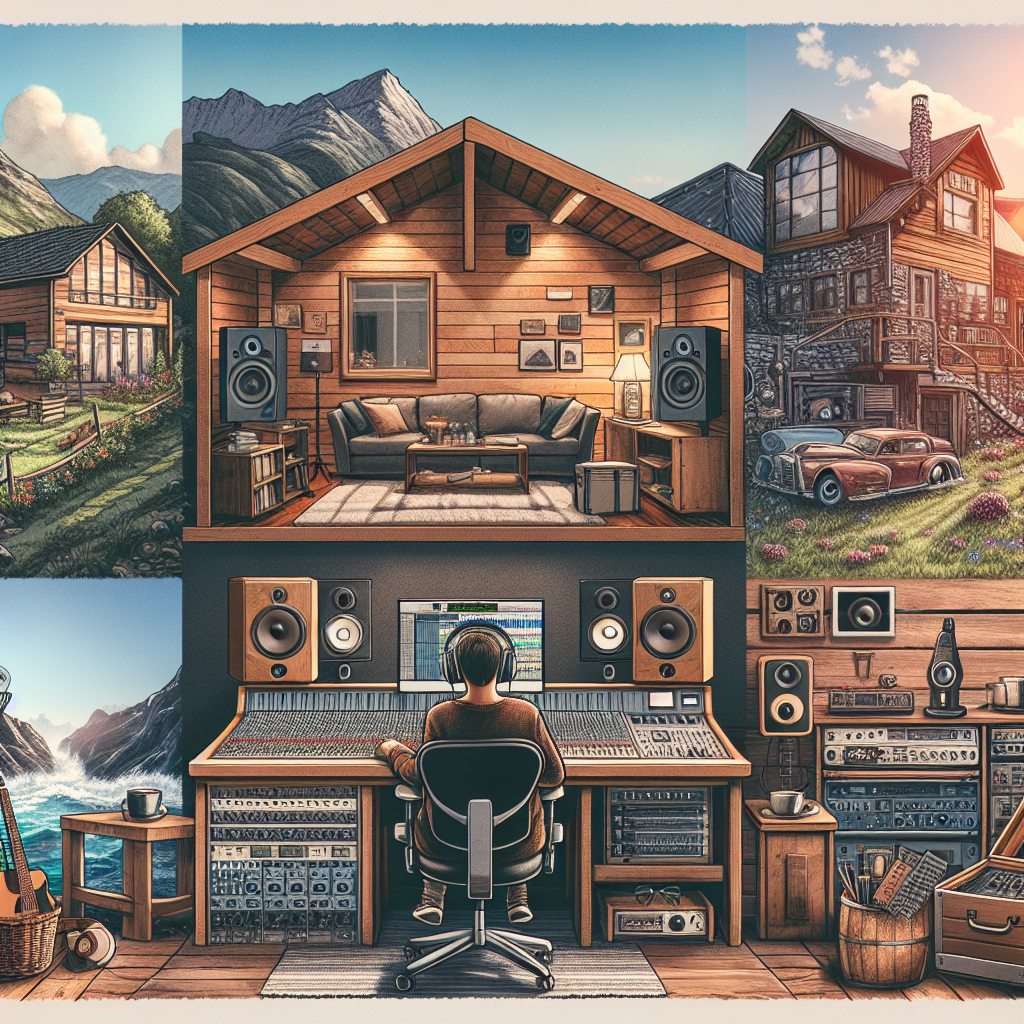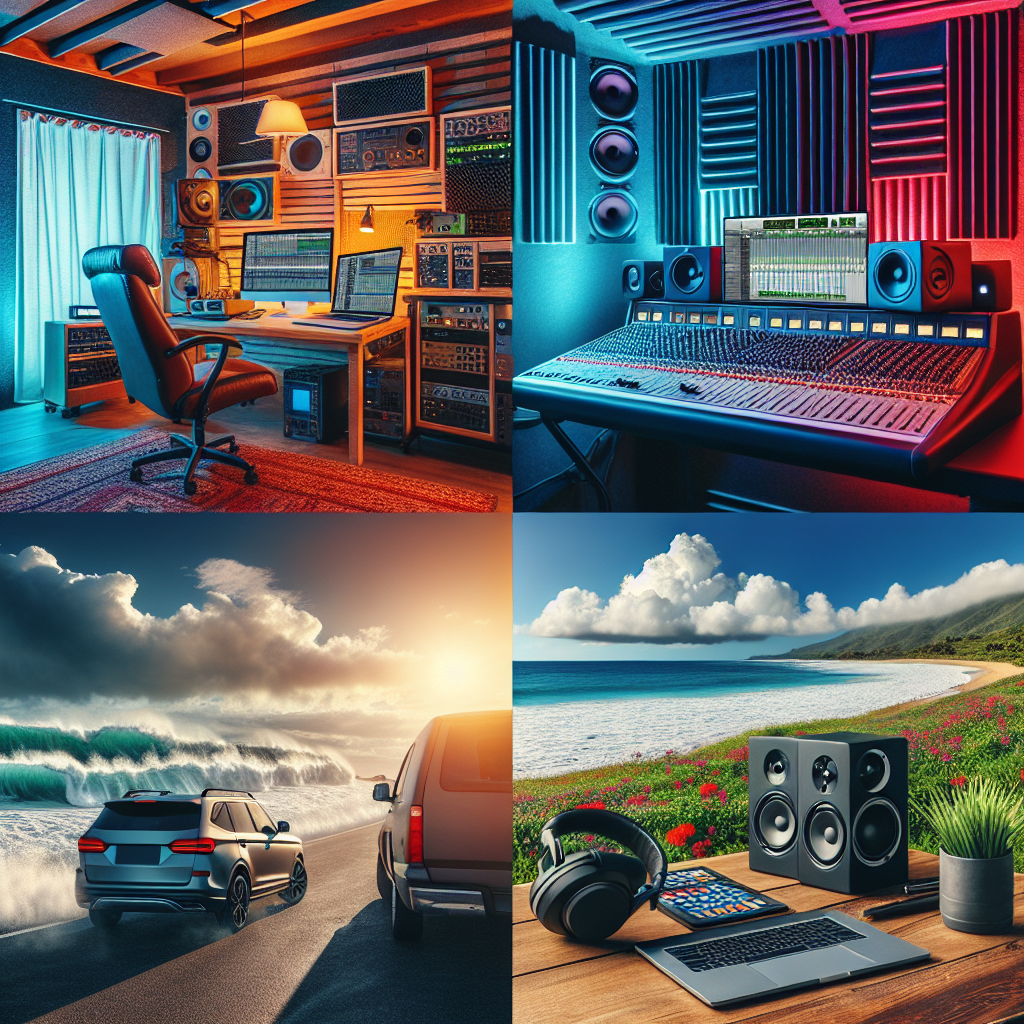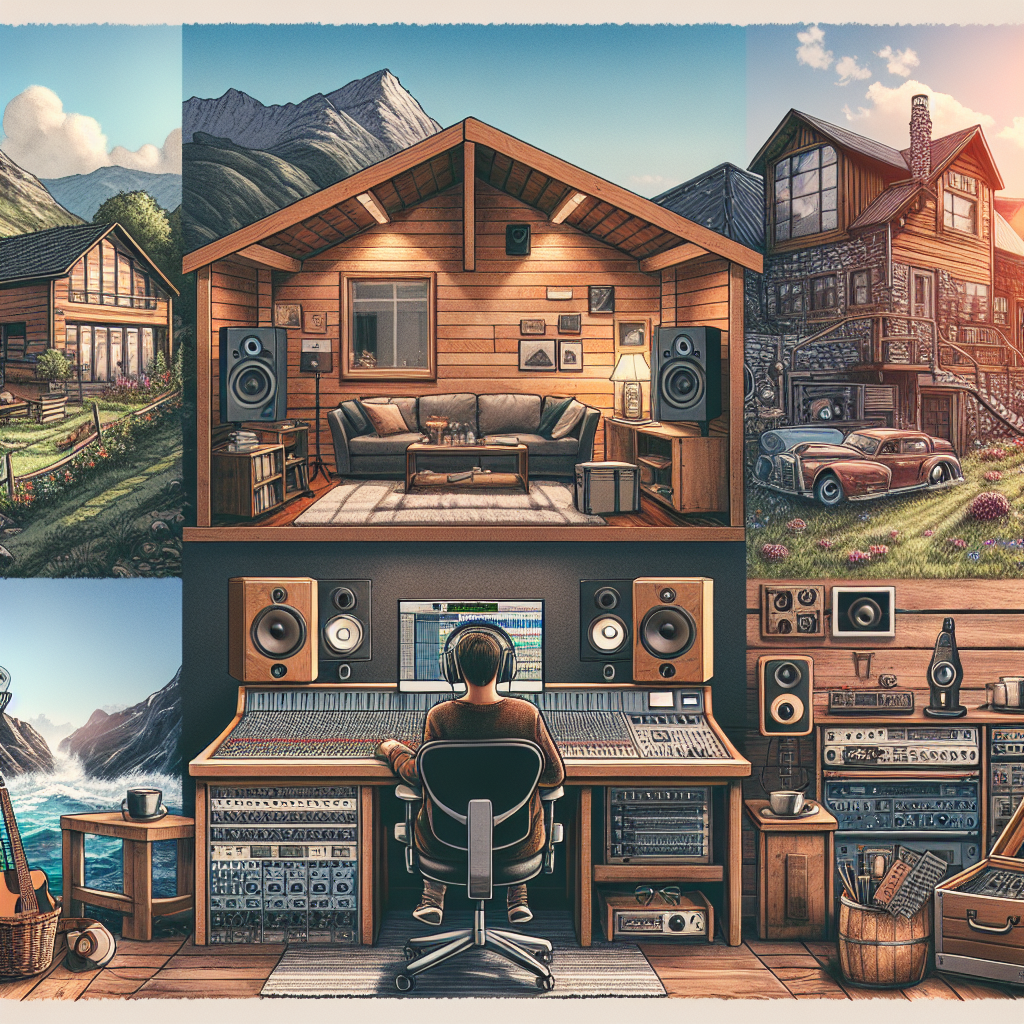
Are you an aspiring musician or a DJ looking for the perfect place to mix music? Look no further! This article will guide you through the best locations and resources for mixing music, helping you unleash your creativity and produce high-quality tracks. Whether you prefer a professional recording studio or a cozy home setup, we’ll explore a variety of options to suit your needs and budget. Let’s embark on this sonic journey together and discover where to mix music!
Recording Studio
A recording studio is a professional facility equipped with state-of-the-art recording equipment and acoustically treated rooms. It offers an ideal environment for capturing high-quality sound recordings. Professional studios are often preferred by musicians and bands who require a professional touch and access to a wide range of equipment and expertise. These studios are typically designed by experts in acoustics, ensuring the best possible sound quality. Additionally, professional studios provide the option to hire experienced sound engineers who can assist in the recording and production process, making it a valuable resource for musicians looking for a polished and professional sound.
Home Studios
Home studios have become increasingly popular among musicians and producers due to advancements in technology. These studios are set up in a musician’s personal space, whether it be a bedroom, basement, or dedicated studio room. Home studios offer the convenience of having a recording space available at any time, without the need for booking or paying for an external space. With the availability of affordable recording equipment and software, it is now possible to achieve high-quality recordings in a home studio environment. While home studios may not offer the same level of acoustic treatment and equipment options as professional studios, they provide a cost-effective and flexible solution for musicians on a budget.

Mobile Studios
Mobile studios are a portable solution for recording on the go. These studios typically consist of a compact setup that can fit in a backpack or small carrying case. With advancements in technology, mobile studios now offer the ability to record professional-quality audio using smartphones or tablets. They come equipped with portable interfaces, microphones, and software that allow musicians to capture their ideas wherever they are. Mobile studios are a great option for musicians who travel frequently or want the flexibility to record in different locations. Whether you’re in a hotel room, at a friend’s house, or on a tour bus, a mobile studio ensures that you can capture your musical inspiration without compromising on sound quality.
Online Platforms
In the digital age, online platforms have revolutionized the way music is produced and shared. These platforms offer musicians the ability to collaborate with others remotely and access a wide range of production tools and resources. There are two main types of online platforms: cloud-based platforms and collaborative platforms.
Cloud-Based Platforms
Cloud-based platforms allow users to store and access their music files and projects on the cloud. This means that musicians can work on their projects from any device with an internet connection. Cloud storage also provides a secure backup for valuable recordings and projects. Additionally, some cloud-based platforms offer online mixing and mastering tools, eliminating the need for expensive hardware or software. Musicians can simply upload their tracks and make adjustments using virtual mixing consoles and mastering tools. Cloud-based platforms offer convenience and accessibility, making them an excellent option for musicians who want to work on their projects from anywhere.
Collaborative Platforms
Collaborative platforms enable musicians to collaborate with others in real-time, regardless of their physical location. These platforms provide tools for sharing project files, making edits, and communicating with other collaborators. They often feature integrated chat functions and audio/video conferencing capabilities, allowing for seamless communication during the creative process. Collaborative platforms are particularly useful for musicians who are working remotely or want to collaborate with artists from different locations. It allows for a dynamic and interactive music-making experience, fostering creative collaborations and opening up new possibilities for artists.

Music Production Software
Music production software, also known as digital audio workstations (DAWs), is an essential tool for recording, editing, and mixing music. DAWs provide a virtual environment that mimics a traditional recording studio, complete with tracks, mixing consoles, effects, and virtual instruments. There are several popular DAWs available on the market, each with its own set of features and workflow. Some of the commonly used DAWs include Ableton Live, Logic Pro, Pro Tools, FL Studio, and Cubase. These software programs give musicians the flexibility to record and produce music from the comfort of their own home or studio. With a DAW, you can easily arrange and manipulate audio and MIDI tracks, apply effects, and mix your music to perfection.
Besides DAWs, there are also plugin suites and virtual instruments that serve as valuable additions to a musician’s arsenal. Plugin suites contain a collection of plugins that provide additional effects, processors, and instruments to enhance the sound and creativity of your music. Virtual instruments, on the other hand, are software emulations of real instruments, ranging from pianos and guitars to synthesizers and drum machines. They allow musicians to access a wide variety of sounds without the need for physical instruments. Music production software, plugin suites, and virtual instruments work together to empower musicians with limitless possibilities in sound creation and manipulation.
DJ Software
DJ software is specially designed for DJs to mix and manipulate music during live performances or mixes. It provides a platform for DJs to seamlessly blend tracks, apply effects, and create unique transitions. There are two main types of DJ software: traditional DJ software and live performance software.
Traditional DJ Software
Traditional DJ software mimics the familiar layout of physical DJ decks and mixers. It allows DJs to load and mix tracks from their digital library, adjust tempo and pitch, and apply various effects. Traditional DJ software often includes features like beatmatching, looping, and sampling, giving DJs the ability to create continuous and seamless mixes. It is commonly used by club DJs, wedding DJs, and other live event DJs who perform in a traditional DJ setup.
Live Performance Software
Live performance software, also known as performance DJ software, offers an alternative approach to DJing by incorporating live looping, remixing, and improvisation. This software focuses on providing tools for real-time manipulation of tracks, allowing DJs to experiment and create unique performances. Live performance software often includes features like MIDI integration, clip launching, and advanced effects, enabling DJs to push the boundaries of their creativity during live performances. It is popular among electronic music producers and DJs who want to incorporate live elements and improvisation into their sets.
Mobile Apps
Mobile apps have transformed the way musicians create and perform music. With the power of smartphones and tablets, musicians can now access a wide range of music production and DJ tools on the go. There are two main types of mobile apps: music production apps and DJ apps.
Music Production Apps
Music production apps bring the capabilities of a full-fledged DAW to the palm of your hand. These apps allow musicians to create music using virtual instruments, record audio, apply effects, and mix tracks. They often feature intuitive interfaces and touch-friendly controls, making music production accessible to beginners and professionals alike. Music production apps are a great option for musicians who want the flexibility to work on music whenever inspiration strikes, without the need for a computer or dedicated studio space.
DJ Apps
DJ apps offer the capability to mix and manipulate music using your smartphone or tablet. These apps provide a portable solution for DJs to perform live sets or mix tracks on the go. DJ apps often include features like beatmatching, looping, effects, and integration with streaming services. They allow DJs to mix tracks seamlessly, create transitions, and engage the crowd wherever they are. DJ apps are popular among beginner DJs, hobbyists, and professionals alike, offering a cost-effective and portable alternative to traditional DJ setups.
Live Sound Systems
Live sound systems are essential for delivering high-quality sound during live performances and events. Whether it’s a concert, outdoor festival, or house party, having a reliable sound system ensures that the music is heard clearly and that the audience has a great listening experience. There are different types of live sound systems designed for various venues and events.
Venues
Venues, such as concert halls, theaters, and clubs, have dedicated sound systems installed to accommodate the specific needs of performers and the audience. These systems include powerful speakers, amplifiers, mixing consoles, and various audio processors. Venue sound systems are typically designed by professionals who understand the acoustic requirements and can tailor the setup to the venue’s specifications. They ensure that the sound is distributed evenly throughout the space, creating an immersive and enjoyable experience for the audience.
Outdoor Events
Outdoor events, such as music festivals, require specialized sound systems that can handle large crowds and open spaces. These systems are designed to project sound over long distances while maintaining clarity and volume. Outdoor sound systems often feature line arrays, which are large arrays of speakers that can be flown or stacked to provide even coverage. They are capable of delivering high-quality sound to large audiences without distortion or loss of clarity. Additionally, outdoor sound systems may include subwoofers to enhance the low-frequency response and provide a powerful bass presence.
House Parties
House parties often require smaller, more portable sound systems that can be easily set up in a residential environment. These systems are typically compact and include powered speakers or portable PA systems. They offer a plug-and-play solution for DJs or musicians who want to provide their own sound reinforcement for a smaller gathering. House party sound systems are designed for ease of use and portability, allowing for quick setup and breakdown without compromising on sound quality. They are an affordable option for creating a vibrant and energetic atmosphere in a more intimate setting.
Music Schools and Courses
Music schools and courses provide structured education and training for aspiring musicians, producers, and DJs. Whether you’re a beginner looking to learn the basics or an experienced musician seeking to refine your skills, music schools and courses offer a variety of programs to suit your needs. There are different types of institutions that provide music education, including colleges and universities, private music schools, and online courses.
Colleges and Universities
Colleges and universities with music programs offer comprehensive courses and degrees in music production, performance, and composition. These programs often cover a wide range of topics, including music theory, ear training, recording techniques, and music business. College and university music programs provide a well-rounded education in music, giving students the opportunity to delve deep into their chosen field and connect with like-minded individuals. They also offer access to state-of-the-art facilities, equipment, and faculty who are experts in their respective fields.
Private Music Schools
Private music schools specialize in providing focused education and training for musicians of all levels. These schools offer individual lessons or group classes in various instruments, music theory, and production techniques. Private music schools often have a more flexible and personalized approach to education, allowing students to tailor their learning experience to their specific goals and interests. They are a great option for musicians who prefer one-on-one instruction or want to focus on a specific aspect of music production or performance.
Online Courses
Online courses have gained popularity in recent years, offering flexible and accessible education options for musicians. Online music courses cover a wide range of topics, from music production and theory to instrument lessons and composition. These courses can be completed at your own pace and provide the convenience of learning from anywhere with an internet connection. Online courses often include video lessons, interactive exercises, and online forums for discussion and feedback. They are a cost-effective way to learn new skills or enhance your existing knowledge without the need to attend a physical institution.
Community Centers and Clubs
Community centers and clubs provide opportunities for musicians and music enthusiasts to come together and share their passion for music. These spaces often host regular events and activities that encourage collaboration, performance, and the exploration of different musical styles. There are several types of events and activities that community centers and clubs organize.
Open Mic Nights
Open mic nights are a popular event at community centers and clubs, providing a platform for musicians, singers, and performers to showcase their talent. These nights often welcome artists of all levels and genres, creating a supportive and inclusive atmosphere. Anyone can sign up to perform a song, play an instrument, or recite poetry. Open mic nights foster creativity, encourage performance skills, and provide an opportunity for artists to connect with like-minded individuals in the community.
Jam Sessions
Jam sessions are informal gatherings where musicians come together to play music, improvise, and collaborate. These sessions can range from small groups of friends playing in someone’s living room to larger organized events at community centers or clubs. Jam sessions give musicians the opportunity to experiment with different musical ideas, learn from others, and develop their improvisation skills. They are a great way to connect with other musicians, explore different genres, and create exciting musical moments.
DJ Nights
DJ nights are events that showcase the skills and creativity of DJs in the community. These nights often feature a lineup of local DJs playing their sets, creating a vibrant and energetic atmosphere. DJ nights provide a platform for DJs to share their music selections, mixing techniques, and crowd-engaging skills. They offer an opportunity for DJs to connect with the community, gain exposure, and contribute to the local music scene.
Home Setup
Setting up a home music production or DJ setup is a popular choice for musicians who want to create music or perform in the comfort of their own space. There are several options for creating a home setup, depending on your needs and budget.
Computer-based Setup
A computer-based setup is the foundation of a home music production or DJ setup. A powerful computer with sufficient processing power and storage capabilities is essential for running music production software or DJ software. It is recommended to use a desktop computer or a laptop with ample RAM and a fast processor to ensure smooth operation and stability. Additionally, investing in a separate hard drive for storing audio files and samples is beneficial to keep your computer’s storage space free and maintain optimal performance.
Hardware Mixers
Hardware mixers are crucial components for both music production and DJ setups. They allow you to control audio signals from multiple sources and route them to various outputs. In a music production setup, a hardware mixer provides control over audio levels and allows for blending and mixing multiple audio sources, such as microphones, instruments, and synthesizers. In a DJ setup, a mixer allows for seamless blending of tracks, applying effects, and adjusting EQ settings. When choosing a hardware mixer, consider the number of channels, built-in effects, connectivity options, and durability to ensure it meets your specific needs.
Monitor Speakers
Monitor speakers, also known as studio monitors, are specifically designed for accurate and balanced sound reproduction. They are an essential component of a home music production setup, providing a reliable reference for mixing and mastering music. Monitor speakers are designed to reproduce sound as accurately as possible, ensuring that you hear the true representation of your music. When choosing monitor speakers, consider factors such as the size of your room, your budget, and your personal preferences in terms of sound characteristics. Investing in quality monitor speakers will greatly improve the accuracy and quality of your music production.
Streaming Services
Streaming services have become the primary platform for music consumption in recent years. They offer access to a vast catalog of music, allowing users to discover, stream, and share their favorite songs and albums. There are two main types of streaming services: digital distribution platforms and music streaming platforms.
Digital Distribution Platforms
Digital distribution platforms facilitate the distribution of music to various online stores and streaming platforms. These platforms allow independent artists and labels to upload their music and make it available to a global audience. Digital distribution platforms handle the logistics of getting your music onto popular streaming services like Spotify, Apple Music, and Amazon Music, as well as digital download stores like iTunes and Google Play. They typically charge a fee or take a percentage of the revenue generated from your music sales and streams. Digital distribution platforms make it easy for musicians to reach a wide audience and monetize their music.
Music Streaming Platforms
Music streaming platforms are the go-to destination for music lovers to listen to their favorite songs and discover new music. These platforms offer both free and paid subscription options, allowing users to stream music on-demand across various devices. Music streaming platforms curate personalized playlists, recommend new music based on user preferences, and provide social sharing features. Popular music streaming platforms include Spotify, Apple Music, Amazon Music, and Tidal. As a musician, having your music available on these platforms opens up opportunities for exposure and reaching a broader audience.
In conclusion, there are various options and resources available for musicians, producers, and DJs to explore and enhance their music-making journey. From professional studios to home setups, online platforms to mobile apps, and live events to music schools, each option offers its own unique advantages and possibilities. Whether you’re a beginner or an experienced musician, there is a wide range of tools and opportunities to suit your specific needs and help you create, produce, and share your music with the world. Embrace the power of technology, tap into the vibrant music community, and unleash your creativity in the ever-evolving landscape of music production and performance.
